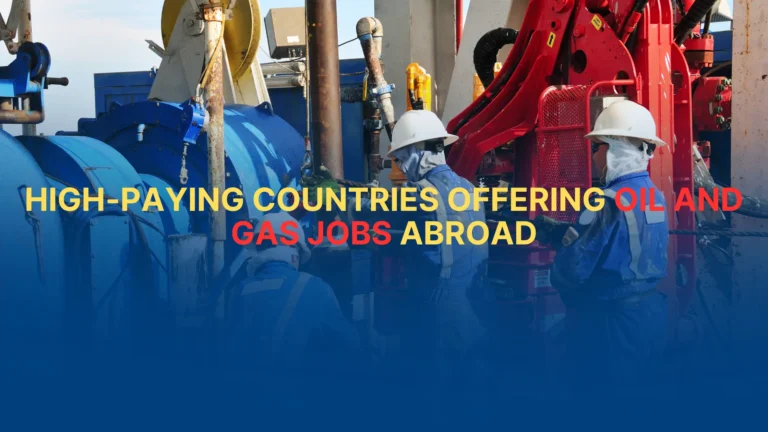$50k Unskilled Jobs in Australia with Visa Sponsorship Opportunities in 2025
Australia remains one of the most attractive destinations for foreign nationals searching for well-paying unskilled jobs with visa sponsorship opportunities. In 2025, thousands of foreign workers are expected to fill workforce shortages in the country’s agriculture, hospitality, construction, and aged care industries.
While many assume that high-paying jobs are limited to degree holders or technical professionals, the Australian labor market presents a different reality—there are various unskilled job roles that do not require tertiary qualifications but still offer competitive salaries, some reaching up to $50,000 per annum.
Australia’s migration program has prioritized filling gaps in the low-skilled labor sector through visa-backed work opportunities. This means that qualified foreign applicants, even without higher education or professional certifications, can be eligible for employment that comes with relocation support, legal work permits, and competitive compensation packages. In a post-pandemic economy, the demand for unskilled labor has risen, particularly in rural regions where labor shortages are more pronounced.
The appeal of these roles lies not only in the earnings but also in the work-life balance that Australia offers, in addition to pathways that can lead to permanent residency or long-term employment. Foreign workers with good health, a clean record, and the ability to follow instructions often find themselves well-positioned for success
Moreover, the promise of visa sponsorship makes it easier for applicants from countries with limited employment prospects to explore and take advantage of the Australian labor market legally.
This article provides in-depth information about how to access these opportunities, the kinds of employers hiring, salary expectations, visa categories, and trusted websites where job openings are listed.
The aim is to present real solutions for job seekers who want a fresh start in Australia with the potential to earn up to $50k per year in unskilled roles while benefitting from employer-sponsored visas.
Entry-level Skills and Experience Required
Unskilled jobs in Australia do not demand formal education or certifications, but they do require a set of basic abilities and work ethics that employers consider essential. These positions often involve physical labor or repetitive tasks, and the ideal candidate must show reliability, punctuality, and the willingness to learn quickly on the job.
In many cases, previous work experience is not a strict requirement, but having some exposure in related fields can be an added advantage.
The most common sectors where unskilled workers are in demand include agriculture, food processing, construction, cleaning services, hospitality, and aged care support. Workers in these sectors are expected to perform duties such as fruit picking, packaging, dishwashing, cleaning hotel rooms, or supporting elderly clients with daily activities.
Although these tasks may seem simple, they require physical stamina, attention to detail, and the ability to follow procedures accurately.
English communication skills, even at a basic level, are often required, especially in jobs that involve customer contact or teamwork. However, some roles in remote locations or farms may not require fluency, making them more accessible to non-native speakers. Additionally, a willingness to work flexible hours, including weekends and night shifts, is frequently requested by employers.
Soft skills such as cooperation, discipline, and patience are crucial. Employers prefer workers who show initiative, can work under pressure, and respect workplace rules. Some jobs may require lifting heavy loads, so physical fitness is another attribute that applicants are expected to have. Safety awareness is also key, especially in construction or industrial environments.
Training is generally provided on the job, which reduces the barrier to entry for many international applicants. Employers offering visa sponsorship tend to invest in onboarding and basic training to ensure that new workers are productive and understand safety regulations. Candidates with a clear willingness to adapt, perform consistently, and remain committed during their contract period often gain preference in selection processes.
Regions with the Highest Payment Structures
While unskilled jobs are available across Australia, certain regions consistently offer higher wages due to the increased demand for labor and the limited availability of local workers. Rural and remote areas, in particular, offer some of the most attractive salary packages and are more inclined to provide visa sponsorship for international workers.
The agricultural belts of Queensland, Victoria, and South Australia are known for offering higher-than-average pay in fruit picking, farm maintenance, and food processing.
In Northern Territory and Western Australia, construction and mining-related labor roles tend to offer higher hourly wages to compensate for the challenging environments and the distance from urban centers. These regions also face persistent labor shortages, making it easier for foreigners to secure sponsored employment opportunities. For instance, a fruit packer or vineyard worker in South Australia can earn significantly more during peak harvesting seasons, sometimes surpassing $25 per hour with overtime benefits.
Hospitality jobs in tourist-heavy areas like Cairns, Darwin, and Byron Bay also pay competitive wages to attract seasonal workers. Restaurants, hotels, and resorts in these regions often hire kitchen hands, cleaners, and housekeeping staff under temporary work visas and offer hourly rates above the national minimum wage. Employers here are accustomed to hiring foreign staff and often assist with visa paperwork, accommodation, and transportation arrangements.
In New South Wales and Victoria, cities like Sydney and Melbourne provide opportunities in construction, delivery services, and warehouse operations. While competition may be higher in metropolitan areas, the hourly pay in these sectors still aligns with or exceeds the national average for unskilled work. Some construction laborers in Sydney, for example, earn upwards of $28 per hour depending on the project and the season.
Foreign job seekers willing to relocate to these high-demand regions not only increase their chances of landing a job but also benefit from better pay, access to visa sponsorship, and long-term career development options. Understanding the geographical distribution of labor shortages is crucial for making informed employment decisions in Australia.
Salary Expectations for Unskilled Workers in Australia
The standard minimum wage in Australia as of 2025 stands at approximately AUD $24.10 per hour, translating to around $45,000 per year for full-time workers. However, unskilled jobs that come with visa sponsorship often exceed this benchmark due to the scarcity of willing local workers and the physical demands involved in the roles.
Some sectors even offer earnings beyond $50,000 annually, especially when bonuses, weekend shifts, and overtime are factored in.
Agricultural jobs such as fruit picking or packing typically pay hourly or piece rates. In high season, workers can earn between $25 and $35 per hour depending on the crop and region. With consistent work, it is entirely feasible to reach or surpass the $50k mark within a calendar year. Workers who stay for the full season often receive bonuses or end-of-season incentives that further boost their income.
Construction laborers in urban areas are among the highest earners in the unskilled labor segment. Entry-level construction jobs often start at $28 per hour and may go up with experience or specific job sites. These roles may also include travel and meal allowances which increase total compensation.
Similarly, warehouse jobs or forklift operations—although technically considered low-skill—may offer salaries ranging between $48,000 and $55,000 depending on shifts and location.
In hospitality, kitchen hands and cleaners can expect hourly rates between $24 and $29. While these jobs may not offer a base salary of $50,000, taking on night shifts or working during weekends and public holidays can help workers achieve that threshold. Some employers also provide free meals and accommodation, effectively increasing take-home income by reducing living expenses.
It is important to note that wages are regulated by national awards and union agreements, which protect both local and foreign workers from exploitation. Job seekers should ensure they are aware of the relevant award wages for their sector. Sponsored jobs generally comply with these laws as part of the employer’s obligation under Australian immigration regulations. Therefore, visa-sponsored roles not only promise stable income but also secure working conditions backed by legal frameworks.
Visa Types and Options for Unskilled Workers in Australia
For unskilled workers aiming to enter Australia legally in 2025, several visa options are tailored specifically for individuals without formal qualifications. These visas offer temporary or semi-permanent rights to work in sectors where domestic labor is insufficient. The most commonly used visa pathways for unskilled laborers are the Temporary Skill Shortage (TSS) visa (subclass 482), the Seasonal Worker Programme, and the Pacific Australia Labour Mobility (PALM) scheme.
The TSS visa allows Australian employers to sponsor foreign workers when a suitable local candidate cannot be found. While originally designed for skilled workers, certain low-skill jobs under regional sponsorships have been included due to persistent labor gaps. Workers under this visa are generally employed for two to four years, depending on the occupation and the agreement with the sponsoring employer. The TSS visa also provides a pathway to permanent residency in some cases.
The PALM scheme is another attractive option for job seekers from Pacific Island nations and Timor-Leste. However, in recent expansions, this program has been extended to workers from various eligible countries to help Australian businesses in regional areas hire reliable labor. Under this scheme, individuals can work for up to nine months in sectors such as agriculture, tourism, and hospitality.
The Working Holiday Visa (subclass 417 or 462) is also widely used, though it is more suited for younger applicants aged 18 to 30. This visa allows individuals to work while traveling across the country and is often used by backpackers to take up casual or seasonal jobs. However, only applicants from eligible countries can apply.
Employers who offer visa sponsorship are required to meet specific immigration standards. They must demonstrate that they are legally established, pay award wages, and provide a safe working environment. Sponsored workers are protected under Australian labor laws and can report any workplace issues without fear of deportation.
Applicants must also meet health and character requirements, including police checks and medical examinations. English language tests are sometimes required, although many unskilled visas do not have strict language criteria. Understanding the visa process and choosing the right pathway is key to securing legal employment and maximizing future migration opportunities in Australia.
How to Secure Unskilled Jobs in Australia
Securing an unskilled job in Australia with visa sponsorship involves strategic planning, credible documentation, and persistence. The first step is to prepare a professional resume tailored for the Australian job market. Even for unskilled roles, employers appreciate well-structured CVs that clearly show prior work history, physical capabilities, and willingness to relocate.
Applicants must also be clear about the kind of work they are ready to do, especially since most roles involve manual labor. A focused job application approach is more effective than applying randomly across sectors. Candidates who show genuine interest in specific roles, such as farm work, housekeeping, or warehouse operations, are more likely to receive interview calls or sponsorship offers.
Direct applications to employers via email or company job portals are often successful, particularly with businesses in regional areas. Australian employers value authenticity and reliability, so being honest about your capabilities and visa needs can help build trust. Some job portals also offer features that filter out positions offering sponsorship, which can streamline the job search process.
It is advisable to register with recruitment agencies that specialize in placing international workers in unskilled positions. These agencies often work with employers looking for labor in hard-to-staff regions and can assist in processing sponsorship-related paperwork. Building connections on platforms like LinkedIn or job fairs hosted by Australian embassies may also increase visibility to potential employers.
One essential tip is to start early. Visa applications, sponsorship processes, and employer interviews can take time, especially when paperwork is involved. Having your documents in order—such as your passport, work references, and medical clearance—can speed up the process and give you an advantage over other candidates.
Ultimately, securing a job in this category requires resilience, clear communication, and a commitment to completing the full duration of your work contract. Many employers are keen on retaining loyal workers, and some may even consider long-term sponsorship for permanent roles. Patience and consistency are crucial.
Companies Hiring Unskilled Workers in Australia
Several companies across different sectors in Australia consistently hire unskilled foreign workers, particularly when local labor is scarce. These employers often participate in official government-supported visa programs and are authorized to sponsor eligible foreign applicants.
Their industries span agriculture, hospitality, cleaning services, construction, and logistics. These companies understand the legal and logistical requirements for international employment and typically provide adequate training, safe working environments, and sometimes accommodation support.
In the agricultural sector, large-scale farms and fruit-packing companies are frequently in need of seasonal labor. Well-known operators in Queensland and South Australia, including Costa Group and Select Harvests, offer employment for fruit picking, packaging, and harvesting.
These companies rely heavily on seasonal workers and are approved employers under the Pacific Australia Labour Mobility (PALM) scheme. Jobs may last several months, especially during harvest seasons, and often come with basic accommodation facilities near the job site.
In hospitality, hotel chains like Accor and Marriott often require kitchen staff, housekeepers, and cleaning personnel, especially in tourist-heavy cities and regional resort locations. These international hotel groups are experienced in dealing with diverse workforces and have a reputation for meeting fair employment standards. Foreign workers in these companies typically receive competitive hourly pay and structured shift schedules.
The cleaning services industry is another major employer of unskilled labor. Companies such as Spotless and ISS Facility Services regularly recruit cleaning staff for hospitals, office buildings, and public spaces.
These roles may require basic English communication skills and a strong understanding of hygiene and safety protocols. Many of these positions are part-time or shift-based but still offer a pathway to earn consistent wages with the potential to reach the $50k mark annually, particularly with overtime.
In the logistics and warehousing sector, major distribution centers and transport companies like Toll Group, Linfox, and Australia Post employ foreign workers as general laborers and sorters. These jobs typically involve loading, unloading, packaging, and organizing goods.
While these are entry-level roles, the physical nature of the work, long hours, and night shifts allow workers to earn substantial income over time.
Construction contractors working on large infrastructure or housing projects also recruit laborers through subcontractors or direct hiring. These jobs are particularly prominent in Western Australia and the Northern Territory, where labor demand consistently outweighs supply. Workers with experience in using basic tools, even without formal certification, are often selected for these jobs if they are reliable and legally permitted to work.
These companies play a vital role in bridging the gap between labor shortages and employment opportunities. They are familiar with immigration policies, adhere to employment regulations, and are generally well-equipped to handle the documentation needed for sponsored workers. Job seekers targeting these companies should prepare strong applications, demonstrate a willingness to relocate, and maintain a high level of professionalism throughout the hiring process.
Employment Websites to Find Unskilled Jobs in Australia
Finding unskilled jobs in Australia, especially those that offer visa sponsorship, requires the use of trusted employment websites and job search engines. Many job seekers from overseas find success through online platforms that list verified job openings across various regions and industries.
These platforms allow users to filter results based on location, job type, and visa sponsorship availability, making it easier to target suitable opportunities.
Seek is one of the most popular and comprehensive job platforms in Australia. It lists thousands of job opportunities, including many in the unskilled category such as warehouse work, hospitality roles, and cleaning jobs. Seek allows applicants to upload resumes and apply directly through the portal. Some listings also explicitly mention visa sponsorship availability, especially in rural sectors.
Indeed is another highly effective platform. It aggregates job listings from company websites and smaller recruitment agencies, increasing the chances of discovering niche or lesser-advertised jobs.
Job seekers can search using keywords like “visa sponsorship,” “unskilled jobs,” or “entry-level” to refine their results. Companies with urgent labor needs often post directly on Indeed due to its wide user base.
Jobsearch, a government-backed job platform, is especially useful for locating regional and rural employment opportunities. It is frequently used by employers participating in official visa schemes like the PALM program.
Job seekers can register, search for jobs based on location, and apply to roles that may include government-supported visa sponsorship. The site is secure, updated frequently, and a good resource for legitimate job postings.
Harvest Trail, managed by the Australian government, is the go-to site for agricultural jobs. It connects workers with farms across the country during peak harvesting seasons. Many listings on Harvest Trail are eligible for visa holders under the Seasonal Worker Programme or PALM scheme. The site provides details on job duration, wages, employer contact, and accommodation availability.
Workforce Australia is another government portal that provides information on local labor shortages, employment programs, and regional jobs. The platform includes resources on visa eligibility and advice on how to find a job under various government schemes. It is especially helpful for individuals who want to combine work with long-term settlement in regional areas.
Some industry-specific recruiters, such as Agri Labour Australia or Backpacker Job Board, focus on connecting foreign workers to unskilled roles.
While the Backpacker Job Board is more popular among working holiday visa holders, it occasionally features sponsored job listings in remote areas. Agri Labour Australia, on the other hand, works directly with agricultural companies and facilitates employment for visa applicants.
Using these platforms consistently, keeping profiles updated, and applying early to seasonal jobs can significantly increase one’s chances of securing employment with visa sponsorship.
It is also advisable to check company websites directly, particularly those known to hire foreign workers regularly. Timely applications, combined with good communication and document readiness, are essential for job seekers looking to move to Australia in 2025.





